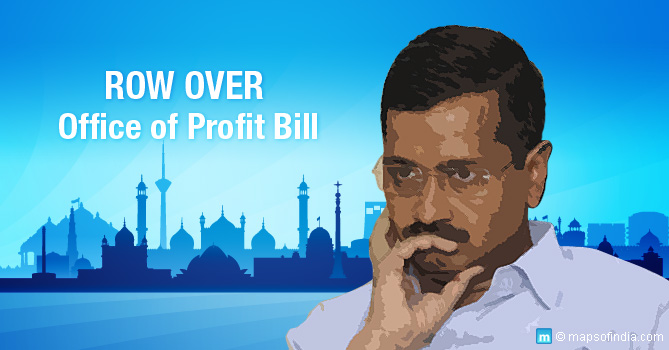The Indian constitutional law prohibiting a member of legislature from holding an office of profit is in the news again. The last casualty of this law was Congress party chief Sonia Gandhi that led her to vacate her Lok Sabha seat in 2006. Now the spotlight has been trained on 21 MLAs of Aam Aadmi Party who are also working as parliamentary secretaries. The MLAs in question face the possibility of being disqualified from their positions under the provisions of this law. The issue came under national spotlight when President Pranab Mukherjee opted to withhold his consent to a bill passed by the Delhi assembly last year. The bill was intended to save certain AAP MLAs from the provisions of the law against holding office of profit .
There are several petitions pending with the Delhi High Court, and also the President, to dismiss MLAs holding profitable positions whereby there are benefited in terms of perks, money, position etc. Right now, AAP has 67 members in the Delhi legislative assembly that has 70 members in all. The party has the mandate to return the said bill, that is, Legislative Assembly (Removal of Disqualification) Amendment Bill, 2015, to the President for passage. The assembly may or may not make any amendments in the same but there is very little likelihood that Mukherjee will view the bill in any different light than what he has now.
Concept of office of profit
The notion of office of profit first evolved in England. Its main aim is to make sure that the lawmaking body remains independent of the various temptations that might come their way if they were connected to positions from where they could be lured away from fulfilling their duties properly and with complete objectivity. This law also attempts to implement the division of powers between various arms of the government, which is an integral part of the Indian Constitution as well.
What the Indian Constitution says
Indian Constitution has not provided a clear definition of the term per se. However, there is some fleshing out of the said concept in articles 191 (1) and 102 (1) that prescribe certain restrictions on both central and state-level legislators as far as accepting government positions is concerned. In case any MP or MLA is found to violate the same then he or she can be disqualified and removed from her seat. Article 102 (1) (a) says that an MP may be disqualified in case he or she holds any office of profit owned by the central government or any state government. However, if the person in question holds an office sanctified by the parliament then this rule shall not apply. The same sort of ruling for MLAs is mentioned in Article 191 (1) (a).
Exemption for ministers
Ministers – at both central and state level – are exempted from the ruling specified by articles 102 and 191. Additionally, if a position being held by a legislator cannot be legally disqualified then the rule of office of profit will not be applicable in such circumstances. This detail is mentioned in the final parts of both the articles.
Office of profit as per NCT Act, 1991
Section 151 (1) (a) of Government of National Capital Territory of Delhi Act, 1991 states that in case a person holds an office of profit he or she will be disqualified as an MLA. This office of profit could be under the state government, or that of any other state or union territory and even the central government for that matter. However, if the position is protected from such dismissal by law then obviously the ruling will not be applicable. Section 15 (1) of the said Act also acts as a safeguard for ministers at different levels, just like sections 102 (1) and 191(1).
According to Section 15 (3) in case of an MLA’s disqualification the President will be the one to whom the matter will be referred and his or her decision would be final in this case. However, before the President makes any decision on such a petition he or she will need to consult the Election Commission and there is no other way that this can happen.
Question of financial benefit
It needs to be noted in this regard that financial benefit is not such an important factor in this regard. People in administrative positions may not enjoy any financial benefits as such but even they may be convicted under the office of profit law.
Guru Gobind Basu vs. Sankari Prasad Ghosal & others case
This 1964 case is an important instance in this context considering the Supreme Court ruling on the same. The ruling stated quite clearly that several factors needed to be taken into account like the authority that appointed the person concerned, the authority that is empowered to end the appointment, the authority which is fixing the pay, the source from which the payment is being made and the power that the accused enjoys because of that position.





